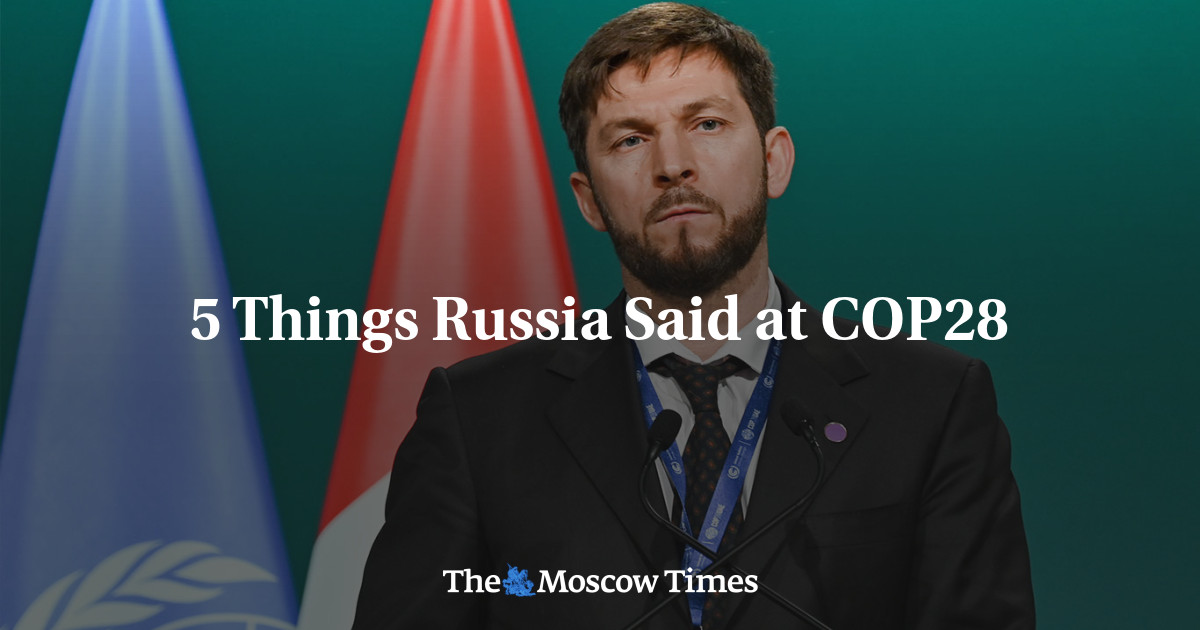
Delegates at the COP28 climate conference on Tuesday raced to hammer out a final agreement as the event barreled into overtime. A draft agreement released the day before sparked outrage among countries that insist on a rapid phase-out of coal, oil, and gas, as the text called for reduced “consumption and production of fossil fuels in a just, orderly and equitable manner.”
Russia, which sent a delegation to the UN’s climate conference this year, has been among a small group of mostly oil-producing countries opposed to including phase-out language in the agreement, which must be reached by consensus.
For Moscow, which remains isolated from the West and bogged down in its war against Ukraine, COP28 is seen as a test of whether its voice can still be heard in global efforts to combat climate change.
Here’s a selection of statements made by members of Russia’s delegation at this year’s climate event:
— A fossil fuel phase-out would have an “immediate” negative impact on South America, Africa and most of the Asia-Pacific region since energy sources cheaper than hydrocarbons “are not yet available,” Deputy Energy Minister Pavel Sorokin said at COP28.
He noted that Russia expects a global increase of 10-15% in fossil fuel consumption by 2050 and that measures need to be put in place to make these technologies “cleaner.”
“Phasing out what serves as the global economic engine [and which costs] a reasonable price … is unrealistic. We’re deceiving ourselves in we go around thinking otherwise,” Sorokin added.
— Russia said it was exploring the possibility of financing a new so-called “loss and damage fund” with its gold and currency reserves that were frozen by the West in response to the invasion of Ukraine.
The fund, announced at the beginning of COP28, would provide developing nations with financial support from wealthier industrialized countries to help them cope with the adverse effects of climate change.
President Vladimir Putin’s climate chief Ruslan Edelgeriev underscored the “urgent need” to help developing countries adapt to extreme weather events caused by warmer temperatures.
— Russia welcomed a U.S.-led initiative to triple global nuclear power capacity by 2050 as part of efforts to reach net-zero greenhouse gas emissions.
“Without nuclear energy, it is impossible to achieve climate goals,” Russian Deputy Economic Minister Vladimir Ilyichev said.
Despite not formally supporting the pledge, Russia, one of the world’s largest producers of nuclear energy, fiercely advocated for nuclear power at this year’s climate conference.
— Russian Deputy Economic Minister Ilya Torosov said that the country would double its renewable energy capacity by 2030, from the current 6 gigawatts to 12 gigawatts — or roughly 5% of the capacity of all power plants in Russia.
As of Tuesday afternoon, Russia was among a handful of holdouts from a pledge — supported by 130 countries — to triple renewables globally by 2030.
Moscow faces regular criticism over its low renewable energy targets, with independent experts arguing that they fail to reduce greenhouse gas emissions low enough to prevent a dramatic increase in global temperatures.
— Russia called efforts to limit global temperature rise to the target of 1.5 degrees Celsius “unattainable.”
“The methods for achieving the 1.5-degree target are very stringent and require colossal investments in technological transformation,” Russian Economic Minister Maxim Reshetnikov said, adding that only “some countries may be able to afford it, but not even that is certain.”
UN Secretary-General Antonio Guterres said Monday that the outcome of COP28 should provide “a credible plan to keep the 1.5-degree goal alive.”